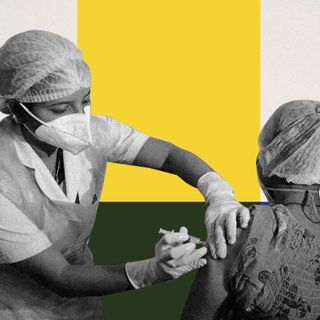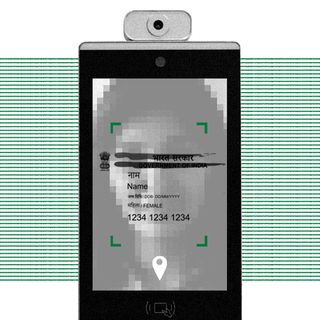
Indian Women Feel Shamed, Harassed by Doctors. How Can Health Care Treat Women Better?
“I postpone all female routine checkups and scans, just to avoid feeling violated and disrespected.”

Joanna, 42, of Mumbai, was single. She was also pregnant.
The doctor had a problem with that.
The doctor harassed her during the peak of her labour about the details of her partners. He asked her and her mother, who accompanied her, how they planned to bring up the child — a “harami” — with no father. He told them they should be ashamed of themselves and should give up the baby to an orphanage — at least that would save them face.
Joanna’s experience mirrors that of many others. Health care access is usually framed in terms of geography and affordability. But for women, access is as much about respect. All 50 women interviewed for this article report meeting with shame, bias, and judgment from health care professionals. And many say they avoid health care in order to avoid interacting with the doctor — male or female — from whom they expect disrespect.
Unsurprisingly, in a patriarchal, conservative country like India, care related to reproductive or sexual health is frequently where women encounter these unsafe and disrespectful environments.
Aarti, a college student from Kochi, says her gynecologist questioned her about her lack of morals after she had asked the doctor for a routine sexually transmitted infection evaluation. The doctor told her to stop having so much “fun” and focus on her studies, Aarti says.
Divya, now 31, recalls a similar experience of shaming. “I had to undergo an abortion in my early 20s. I approached a pretty progressive-seeming gynecologist to get further details. I was interrogated and shamed for over an hour about the existence of my sex life as a single woman.”
Many of the women interviewed said they are reluctant to visit these specialists to receive necessary care so as not to be demeaned, harassed, or even assaulted. They shared they would rather risk their health than go through the experience.
“I had my first uncomfortable experience during my first pregnancy. The doctor passed comments on my body [and intimate areas] and how I should know that I would never look this good again. That was not my only experience, and, ever since, I have been uncomfortable visiting any female-health doctors. I am happy to go to my GP, but I postpone all female routine checkups and scans, just to avoid feeling violated and disrespected,” shares Savitri, 49, of Jaipur.
Related on The Swaddle:
For Women With Chronic Illness, Health Mentorship Is an Essential Part of Health Care
Such violation and disrespect also extend to health care settings outside the doctor’s office. A 14-year-old from Mumbai shared her experience during a visit with an ultrasound technician. “The nurse felt free to pull up my top and place tissues over the rest of my chest. She did not ask for permission or brief me on the process. Due to Covid19, my mother was not allowed to enter the room,” she says. “During the examination, the [male] technician asked if I had started my period. Unsure of boundaries, I responded with an affirmative. He then continued to comment about how flat-chested I was and that my breasts would grow out with time. He also shared that most men prefer heavier-busted women but I shouldn’t worry. I was so uncomfortable but did not know what to do.”
Others recount outright abuse while undergoing routine health care.
“On undergoing a breast ultrasound, the technician felt it was all right to roll his hands over my breasts, without any warning,” says Lata, 37, of Kanpur. “At my questioning, he claimed that this was to ascertain where potential lumps could be located. He did not need to touch my breasts. This was sexual harassment at a major leading hospital in the country. I immediately left and filed a complaint. The technician still works there.”
To further complicate matters, due to social norms around gender coupled with the complex power dynamics amongst families and doctors, women and girls are also denied the right to make decisions about themselves and their bodies.
Unlike Divya, Sarayu, 26, of Guwahati, was shamed for not aborting a female fetus. Her in-laws and husband felt having a son was preferable and wanted her to try again. They consulted a family doctor and gynecologist who identified the gender of the child as female. Sensing her resistance, the doctor made her undergo an abortion under a false pretext, without her consent.
All of this is rooted in a culture of medical education that dehumanizes women and blatantly disregards their agency.
80% of the women interviewed who had been pregnant shared horror stories about labor. Many had socks or napkins stuffed in their mouths to control the screaming, and some were pinched and slapped — the latter (falsely) explained as a method to induce labor. There are many, many more such stories. Anu, a female doctor from Hisar, shares that, “labor wards in government hospitals are scream fests. During our field training, senior doctors used to joke that if you were having a rough day, it was best to be allocated to the labor ward, as you could freely yell and vent your frustrations at the patients there. As a woman, this felt dehumanizing and was scarring.”
Related on The Swaddle:
Mothers‑in‑Law Restrict Women’s Reproductive Agency by Isolating Them: Study
Many see having more women doctors among India’s overwhelmingly male medical workforce as the logical solution to this problem. However, more than 70% of the interviewed women shared that this level of abuse and harassment occurred irrespective of the gender of the doctor. Although harassment or disrespect may manifest differently between doctors of different genders, the result is the same, reflecting the subtle power imbalance between female patients and medical professionals, which gives the latter opportunity to misappropriate the agency of their patients.
Kamala, 32, currently of Chandigarh, had her first negative experience with a gynecologist while living in Surat. But he was known to the family, so she had never been able to switch doctors. When she moved to Chandigarh, however, she was keen to find a female gynecologist. “I thought, ‘She’s a woman so maybe she will understand my problems better.’” Kamala says. “I had been open and frank with my questions. I never expected so much judgment and shame [from her]. I was so humiliated and felt so embarrassed in my own body. Now I don’t know which is better — a male or female doctor?”
Safe, respectful avenues for women’s health in India are urgent and crucial in a country where every 1.69 hospital visits by a man correspond to only 1 hospital visit by a woman. During childbirth, women are four times more likely to die in India versus Sri Lanka and 7.6 times more likely to die in India than in the United States. Furthermore, 21% of women do not receive any prenatal care during their pregnancies.
Dignified spaces with no judgment can transform the quality of care, improve access and reduce female deaths. In a campaign called “Hamara Swasthya, Hamari Awaz,” which reached 150,000 women in India, 23% of women shared their top aspiration in terms of maternal health care was to receive dignity and respect. Out of the total 23%, almost a fifth of the women requested respectful behavior from their healthcare provider, 7% sought informed choice, counseling, and consent, and 4% asked for confidentiality during routine visits and treatment. 5% of the women also prioritized no sexual harassment by doctors or staff.
Women deserve more transparent systems that hold doctors and physicians accountable. The experiences recounted by women and girls here are much more than just a lack of bedside manners. It is important that women and girls are provided detailed information regarding medical processes and procedures. Furthermore, consent must be discussed and confirmed at all stages of health care.
The broader culture of disregarding women’s voices is echoed in the microcosm of health care. Women and girls deserve a cultural reckoning with the fact that India is home not only to horrific violence against them, but also to the slower, more insidious erosion of their physical health by the very men and women entrusted to care for it.
Devina Srivastava works on issues of gender, economic inclusion, and digital development. She has worked with numerous non-profits across the world on digital identity, financial inclusion, menstrual health management, and migration. She holds a Master of Public Administration from Columbia University.
Related


The Government Is Testing an Aadhaar‑Based Facial Recognition System for Tracking Covid19 Vaccination
